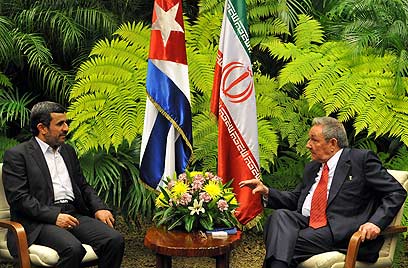
WASHINGTON – Iranian President Mahmoud Ahmadinejad, who is currently on an official tour of Latin America, commented Thursday on the latest assassination of an Iranian nuclear scientist in Tehran, saying that Iran was "being punished for no reason."
Speaking before students at Havana University, Ahmadinejad did not comment directly on the hit, which Iranian official have already blamed Israel and the United States for, but wondered: "Have we ever attacked anyone? Have we sought more than we need? Never. We only want to pursue justice."
Related stories:
- Tehran blast kills nuclear scientist
Report: Israel preparing for nuclear Iran
MI chief: Iran, Hezbollah arming Syria
While in Cuba, Ahmadinejad meant with President Raul Castro, but refused to take the media's questions afterwards.
Meanwhile, a second US aircraft carrier, the USS Carl Vinson, has arrived in the Persian Gulf region, the Pentagon confirmed, calling the move "routine" and denying any link to mounting tensions between the US and Iran.
Backed by a cruiser, destroyer and with almost 80 planes and helicopters on board, the USS Carl Vinson carrier strike group "arrived in the US 5th Fleet area of responsibility (AOR)" on January 9," a Fifth Fleet statement said. The area covers the Gulf, the Red Sea, the Gulf of Oman and parts of the Indian Ocean.

Ahmadinejad and Castro (Photo: AFP)
Pentagon Spokesman John Kirby said that the Carl Vinson was "not in the Gulf" and had not gone through the Strait of Hormuz – a key oil route which Iran has threatened to close as tensions with the West flare.
The Carl Vinson was due to relieve another aircraft carrier, the USS John Stennis, which is in the region, Kirby said.
The USS Abraham Lincoln is also en route to join the Carl Vinson from the Indian Ocean, according to the US Navy.
"The fact that there are two carriers in that AOR is not an indication of anything specific in respect to Iran," Kirby stressed, insisting: "There is no change to force posture in the region."
The Carl Vinson was due to relieve another aircraft carrier, the USS John Stennis, which is in the region, Kirby said.
Also on Thursday, Japan vowed to take "concrete steps" to cut Iran oil reliance.
Tokyo's statement came in response to an appeal for support from visiting US Treasury Secretary Timothy Geithner, as Washington steps up efforts to sanction Tehran over its disputed nuclear program.
Geithner welcomed Tokyo's cooperation, an encouraging sign for US foreign policy after China rebuffed US sanctions aimed at starving Iran of the oil revenues that provide the country of 74 million people with a vital economic support.
Iran faces the prospects of cutbacks in oil sales to China, Japan and India, its top three buyers who together take more than 40% of its crude exports. The European Union, a major buyer, has committed to banning imports of Iranian oil.
Japan Finance Minister Jun Azumi said Iranian crude makes up 10% of Japan's overall oil imports.
AP and AFP contributed to this report
- Twitter Receive Ynetnews updates
directly to your desktop















